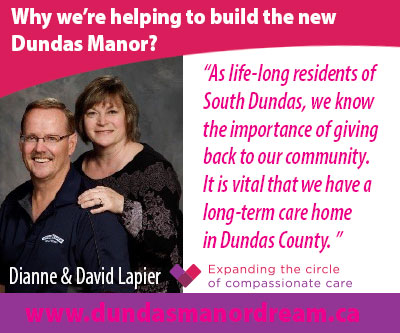Michelle O’Donohue &
Kalynn Sawyer Helmer
Record Staff
CORNWALL – Living with dementia can be intimating and even lonely at times. Sabrina McTaggart and Lisa Herjavec, facilitators of the Minds in Motion® program from the Alzheimer Society of Cornwall and District, are working to make living with dementia or caring for someone with dementia easier.
The Minds in Motion® program is an eight-week activity series for individuals with dementia and their caretakers. Once a week, participants meet to engage in activities that exercise their bodies and minds to promote healthy brain activity.
“Every week we have a different theme but it all ties into leisure and also trying to find different leisure activities within the community,” explained McTaggart. She went on to say that they try “to make different links within the community,” with the hope that once the program has concluded, participants are able to do these activities on their own, perhaps even shedding light on activities participants may not have been aware of beforehand.
Throughout the eight weeks, and particularly on the first day, participants are asked what they would like to see within the program or if there are guest speakers they would be interested in hearing. McTaggart and Herjavec then try to accommodate their participants. They recalled a session during their current Cornwall program in which they played the board game Scattergories, noting that it was great to see the participants, both individuals living with dementia, and their caregivers, “working together… you definitely saw the wheels turning throughout the activity,” they said.
The weekly sessions last approximately two hours, and typically begin with a 45-minute physical component. “We start off with some walking exercises and everybody goes at their own pace. We then might do some ball exercises that really works on cardio and strength… and then we finish with some more walking exercises,” remarked McTaggart. The participants find it a “good challenge”, added Herjavec, and “week by week we try to increase the difficulty,” concluded McTaggart. Every participant is encouraged to take their time and only do as much as they are comfortable with during the physical component.
This is followed by a short break and an hour of cognitive activities. “We definitely know that regular physical activity and mental stimulation are just great for your health. They encourage the development of new brain cells, so we’ve really tried to push that every week. Physical activity is not just great for your body but for your brain also and we feel like the participants are starting to be aware of that as well as the benefits of mental stimulation,” said McTaggart.
The program is more than just mental and physical activity once a week however. “The program itself, both the cognitive and physical component, is about the caregiver and person with dementia doing the activities together… and learning new things that they can do together. They receive take home activities after each session that they do together during the week that we discuss at the next session,” said Herjavec. She went on to note that there is an upcoming session with a specific focus on “community resources” and services “for both the caregiver and person with dementia.”
Most importantly the couples are forming friendships during the sessions with other couples in similar situations. “We laugh probably 80 to 99 per cent of the time in the group,” noted Herjavec. McTaggart added, “It’s not just caregivers interacting with caregivers and individuals with dementia interacting with individuals with dementia, it’s really a crisscross that you see. People helping other people, getting out of their comfort zone.” McTaggart went on to say that they noticed many individuals who “just wanted to make friendships which was a main reason why they wanted to come to Minds in Motion® and we really see that happening week by week individuals are more comfortable and interacting with everybody in the group.”
Already McTaggart and Herjavec are seeing improvement in their clients. They recalled one couple who told them about the exercises they were doing every night and documenting their progress which was steadily improving.
Each program can take a total of 22 participants made up of 11 couples. “Even couples like mother and daughter, father and son, father and daughter. It’s really great for them to be able to participate with their parents in something that’s challenging for both of them. When we’re laughing all together every week, that is super rewarding,” said McTaggart. “We talked about laughter last week in our group, and how it is helpful in relieving stress… I think we laugh most of the time,” added Herjavec.
During the program, assessments are completed, and results are collected and later shared with the Alzheimer’s Society of Canada. The program, which has been operational for a few years in other parts of the country, has seen a lot of success, and great demand for the classes. Minds in Motion® is set to begin in Williamsburg for any nearby residents in March 2018. Registration is now open for Williamsburg, call 613-932-4914. For more information about the program visit www.alzheimer.ca/en/on/We-can-help/Minds-In-Motion.










